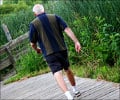Some young people felt easier to do dual-tasking more than one task compared to single-tasking and doing each task separately.

‘The change in brain activity exhibited by those who went walking and improved at the task suggests increased flexibility or efficiency in the brain.’





“There was no predictor of who would fall into which category before we tested them, we initially thought that everyone would respond similarly,” said Eleni Patelaki, a biomedical engineering PhD student at the University of Rochester School of Medicine.Improving Means Changes in the Brain
Using the Mobile Brain/Body Imaging system, researchers monitored the brain activity, kinematics, and behavior of 26 healthy 18- to 30-year-olds as they looked at a series of images, either while sitting on a chair or walking on a treadmill.Participants were instructed to click a button each time the image changed. If the same image appeared back-to-back participants were asked not to click. Performance achieved by each participant in this task while sitting was considered their behavioral baseline.
When walking was added to performing the same task, investigators found that different behaviors appeared, with some people performing worse than their sitting baseline — as expected based on previous studies — but also with some others improving compared to their sitting baseline.
How Walking can Build Up the Brain?
The Electroencephalogram, or EEG, data showed that the 14 participants who improved at the task while walking had a change in frontal brain function which was absent in the 12 participants who did not improve.Analyzing their behavior and brain activity, researchers found a surprising difference in the group’s neural signature and what makes them handle complex dual-tasking processes differently.
These findings have the potential to be expanded and translated to populations where we know that the flexibility of neural resources gets compromised.
Advertisement
Advertisement















